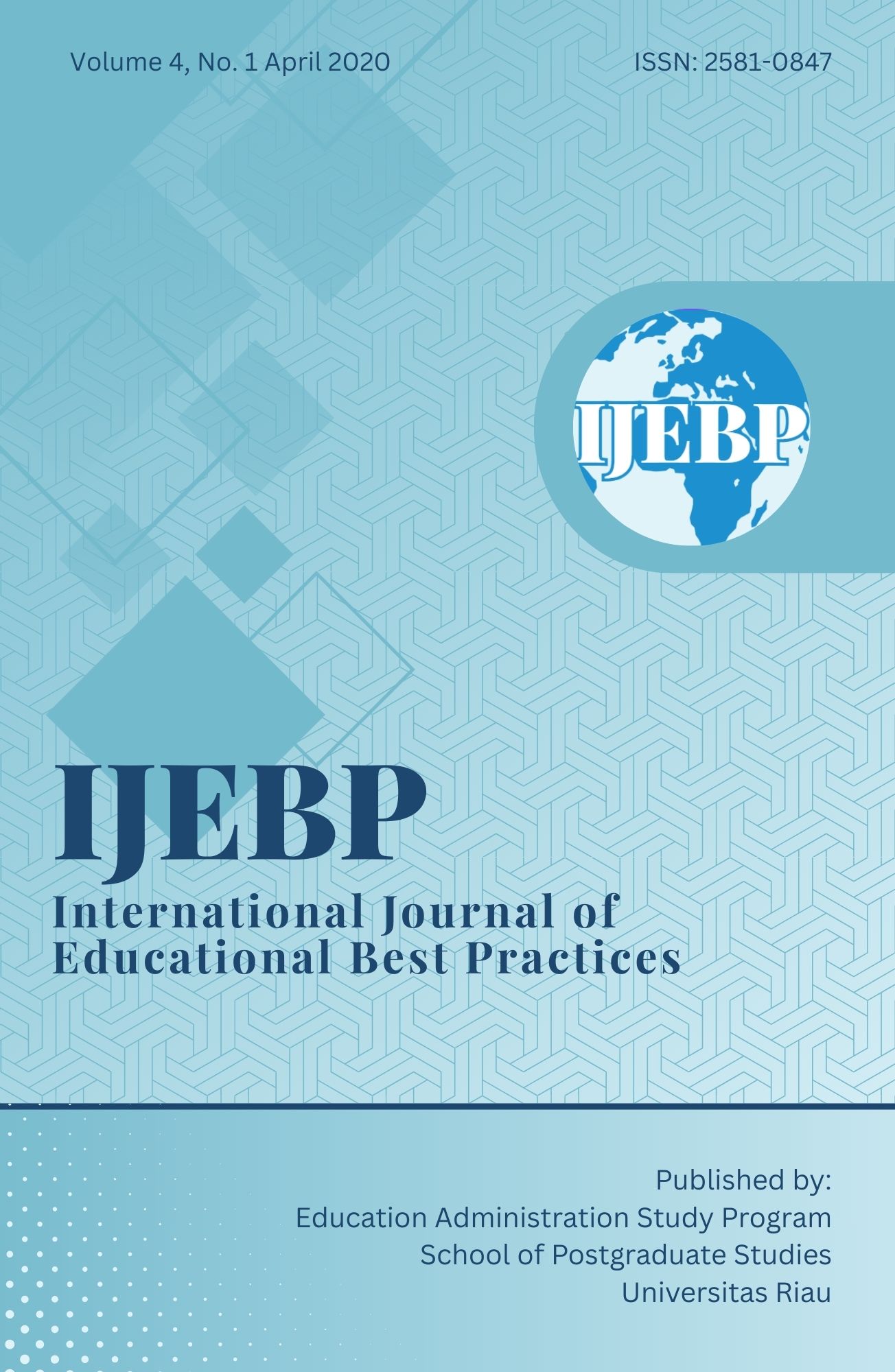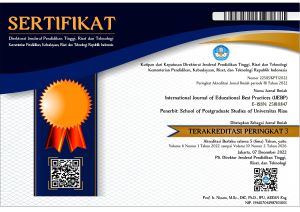PRINCIPALS’ VIEW ON PERFORMANCE OF ELEMENTARY SCHOOL TEACHERS IN PEKANBARU, RIAU-INDONESIA
DOI:
https://doi.org/10.31258/ijebp.4.1.17-28Keywords:
Principals' expectations, school challenges, teachers' performanceAbstract
It cannot be denied that the performance of teachers will greatly influence the success of schools in achieving its goals. This descriptive research is intended to discuss: (1) the principals' view on the performance of public elementary school teachers in Pekanbaru, Riau, Indonesia; (2) principals' expectations for the teachers' performance in the future; and (3) challenges faced by principals to improve teachers' performance in the future. This descriptive quantitative research was carried out at public elementary schools in Pekanbaru in May 2019 to October 2019. By using a proportional random sampling technique, 66 of 191 elementary school principals spread across 12 districts in Pekanbaru were selected as the sample. The questionnaire addressed to the principal was used as an instrument which was then analyzed through descriptive statistical analysis. In the end, it can be concluded that the best performance of teachers is in implementing the learning process. However, their performance in carrying out additional tasks in schools was rated by principals as the lowest average of all categories. The principals' expectations of the teachers' performance in the future are related to improving teacher competencies as well as improving the ability to utilize technology and equipment available at school. While the challenges faced, however, are related to the lack of willingness of teachers to continue their education and limited funds to participate in various training.
References
Abubakar, A. (2015). The Impact of Teacher Certification toward the Education Quality at Islamic senior high schools in Kendari. Jurnal "Al-Qalam", 21 (1), 117-128.
Adu, E. O. & Olatundun, S. O. (2007). Teachers’ Perception of Teaching as Correlates of Students’ Academic Performance in Oyo State Nigeria. Essays in Education, 20: 57-63.
Aguinis, H. (2009). An Expanded View of Performance Management. (in J. W. Smither & M. London (Eds.), Performance management: Putting research into action. San Francisco, CA. Jossey-Bass.
Akinsolu, A.O. (2010). Teachers and Students’ Academic Performance in Nigerian Secondary Schools: Implications for Planning Florida. Journal of Educational Administration and Policy, 3(2): 86-103.
Cresswell, J. W. (2009). Research design: Qualitative, quantitative, and mixed methods approach (3rd ed.). California: SAGE Publications, Inc.
Fusco, D. (2000). The role of performance in teacher education: Teaching developmental psychology developmentally. Teacher Education Quarterly, 27 (4), 89-105.
Indonesian Government. (2005, December 30). Government Law No 14 the Year 2005 about Teachers and Lecturers. Jakarta, Indonesia. Retrieved from: (www.jdih.kemenkeu.go.id/fullText/2005/14TAHUN2005UU.HTM).
Indonesian Ministry of Education and Culture. (2007, May 4). Regulation No 16 the Year 2007 about Teacher Qualification Standard. Jakarta, Indonesia. Retrieved from (http://dikbud.bandaacehkota.go.id/download/permendiknas-no-16-tahun-2007-tentang-standar-kualifikasi-akademik-dan-kompetensi-guru/.).
Jalal, F., Samani, M., Chang, M. C., Stevenson, R., Ragatz, A. B., & Negara, S. D. (2009). Teacher certification in Indonesia: A strategy for teacher quality improvement. Indonesia. The Ministry of National Education.
Jay, A. (2014). The principals' leadership style and teachers' performance in secondary schools of Gambella regional state. Doctoral dissertation. Institute of Education and Professional Development Studies, Jimma.
Laporan Kinerja Instansi Pemerintah (LKjIP) Provinsi Riau tahun anggaran 2017 [Riau Province Government Institution Performance Report (LkjIP) for the 2017 fiscal year].
Lydiah, L. M. & Nasongo, J. W. (2009). Role of the Headteacher in Academic Achievement in Secondary Schools in Vihiga District, Kenya. Current Research Journal of Social Sciences, 1(3): 84-92.
Maicibi N. A. (2003). Pertinent issues in employee management: human resource and educational management. Kampala. Net Media Monitor Publishers.
Matthews, B., & Ross, L. (2010). Research methods: A practical guide for the social sciences. England. Longman.
Samsudin. (2006). Manajemen Sumber Daya Manusia. Bandung. Pustaka Setia.
Sawchuk, S. (2015). Issues A-Z: Teacher evaluation: An issue overview. Education Week. Retrieved on April 20, 2017 from: (http://www.edweek.org/ew/section/multimedia/teacher-performance-evaluation-issue-overview.html/).
Shehnaz Tehseen. (2015). Factors Inflfluencing Teachers’ Performance and Retention. Mediterranean Journal of Social Sciences, 6(1): 233-244
Shulhan, M. (2017). Dialektika Gaya Kepemimpinan Transformatif dan Madrasah Unggul Dalam Perspektif Kebijakan Daya Saing Pendidikan Bermutu. TA‟ALLUM: Jurnal Pendidikan Islam, 5(2): 263-292.
Stringfield, S. & Teddlie, C. (1991). School, Classroom and students’ Level Indicators of Rural School Effectiveness. A Journal of Research in Rural Education, 7(1):15-28.
Suliswoyo, D., Nasir, R., & Maryani, I. (2016). Identification of teachers' problems in Indonesia on facing the global community. International Journal of Research Studies in Education, 6 (2), 81-90.
Suryahadi, A., & Sembodo, P. (2013). Assessment of policies to improve teacher quality and reduce teacher absenteeism. SMERU Working Paper . Jakarta: The SMERU Research Institute.
Wirth, K. R. & Perkins, D. (2013). Learning to learn www.macalester.edu/academics/geology/wirth/learning.doc.
Yala, P. O. & Wanjohi, W. C. (2011). Performance Determinants of KCSE in Mathematics in Secondary Schools in Nyamira Division, Kenya. Asian Social Science, 7(20): 107-112.





